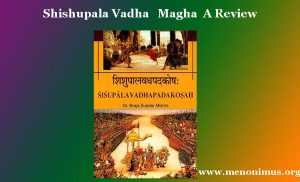Shishupala Vadha | Magha | A Review
Shishupala Vadha Magha A Review
Shishupala Vadha by Magha-A Review
Introduction:
“Shishupala Vadha,” an epic poem composed by the ancient Indian poet Magha, is a literary masterpiece that has captivated readers for centuries. This work holds a significant place in classical Sanskrit literature and is renowned for its intricate poetic craftsmanship, philosophical depth, and portrayal of historical events from the Mahabharata.
Poetic Craftsmanship:
Magha’s mastery of poetic techniques is evident throughout the poem. His use of alankaras (figures of speech) such as simile, metaphor, and alliteration, coupled with vivid descriptions and rich vocabulary, creates a mesmerizing tapestry of words. The use of ornate language adds to the grandeur of the narrative, enhancing the reader’s engagement and the aesthetic experience.
Narrative Structure:
The poem follows a traditional epic structure, with 20 cantos containing around 1,400 verses. The narrative focuses on the slaying of Shishupala by Lord Krishna during the Rajasuya sacrifice. Magha’s meticulous planning of the sequence of events ensures a balanced pace of storytelling, keeping readers engrossed while maintaining the gravity of the story’s context.
Character Portrayal:
Magha’s character delineation is remarkable. The protagonists, Krishna and Shishupala, are portrayed with intricate psychological nuances. Krishna’s divine attributes are depicted through his dialogue, actions, and moral dilemmas, while Shishupala’s complex mix of arrogance, anger, and enmity is portrayed vividly. Supporting characters are also well-developed, contributing to the multidimensional nature of the narrative.
Philosophical Depth:
Interwoven with the historical events is a profound exploration of philosophical themes. Magha delves into concepts such as dharma (righteousness), karma (actions and consequences), and the inevitability of destiny. Through dialogues and inner monologues, he raises questions about the moral implications of actions and the role of divine intervention in human affairs.
Ethical and Moral Considerations:
The poem raises thought-provoking ethical questions about the limits of forgiveness, the nature of rulership, and the consequences of one’s choices. The conflict between dharma and personal enmity, as exemplified by the central characters, prompts readers to reflect on the complexities of human behavior and decision-making.
Historical and Cultural Context:
Magha’s ‘Shishupala Vadha’ is deeply rooted in the cultural and historical context of ancient India. The poem provides insights into the social structure, religious practices, and political dynamics of that era. This contextualization enriches the reader’s understanding of the characters’ motivations and actions.
Impact and Legacy:
Since its composition, ‘Shishupala Vadha’ has enjoyed both critical acclaim and popular recognition. It has influenced subsequent literary works, including commentaries, adaptations, and retellings in various languages. Scholars and artists have drawn inspiration from Magha’s craftsmanship and philosophical themes.
Conclusion:
In ‘Shishupala Vadha,’ Magha demonstrates a remarkable fusion of poetic excellence, narrative prowess, and philosophical inquiry. The poem’s enduring relevance lies in its exploration of human nature, ethical dilemmas, and divine intervention, all of which continue to resonate with readers across generations. Magha’s work continues to stand as a testament to the power of literature to convey complex ideas while captivating the imagination. 0 0 0.
Shishupala Vadha Magha A Review
Read More: Sri Krishna Kirtan-A Review
N. B. The article originally belongs to the book ‘The Reviews of Epic Literature Around the World Vol-I‘ by Menonim Menonimus.








